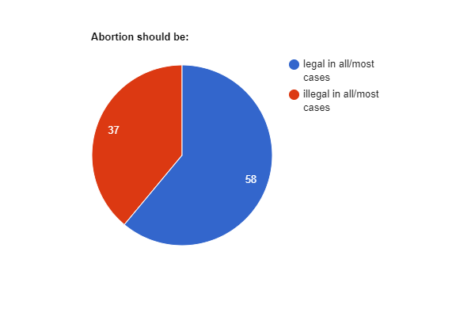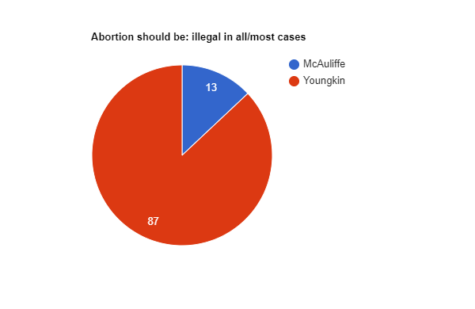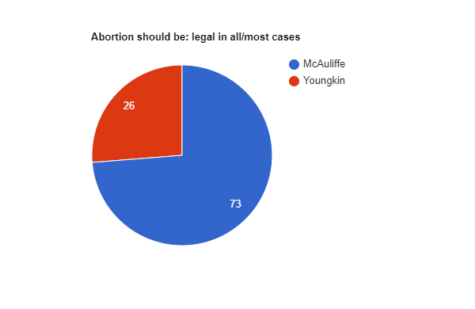The Future of Abortion in America
On January 22, 1973, the Supreme Court’s landmark decision in Roe v. Wade made all abortions in the United States legal. In the years prior, hundreds of women died every year from illegal abortions. Today, that decision is at risk. On September 1st, 2021, Texas’ restrictive abortion law, also known as Senate Bill 8 (SB8), went into effect, banning all abortions after the “fetal heartbeat” is detected. Fetal heartbeat is defined within the text of the law as “cardiac activity or the steady and repetitive rhythmic contraction of the fetal heart within the gestational sac.” But most people, especially those with irregular menstrual cycles, don’t know they’re pregnant. The law has no exceptions for rape or incest and can ban abortions after six weeks, when most women are unaware of their pregnancy. Even pro-life advocates disagree with the law. “I don’t think the ends always justify the means,” sophomore Lillian Foos said. “I agree with what it’s trying to accomplish, but the way they’re going about it seems wrong to me.”
SB8 is remarkable because it’s the first of its kind to go into effect; other laws in Louisiana and Georgia passed through their legislative houses but were struck down in court. Part of the reason why is because of its unique structuring. SB8 is enforced not by Texas’ government but by the people. Under it, any American citizen, regardless of what state they’re from, can sue someone from Texas who “aided or abetted” another Texan getting an abortion. That means Uber drivers, doctors, or people who donated money to get the procedure done. Not only that, but if the prosecutor wins, their legal fees are paid by the defendant, and they get, at minimum, $10,000. Conversely, if the defendant wins, they don’t get the payout, and they are responsible for their legal fees.
In theory, people could travel to neighboring Oklahoma or Louisiana to get their abortion instead. But that requires money and time. SB8 affects everyone in Texas, especially low-income women and women of color, who have a harder time getting time off from work and gathering the funds to travel. And other lawmakers from Florida have taken note, and according to TIME, pledged to propose similar laws in their state. Glenn Youngkin, the Republican Governor-elect in Virginia, has stoked fears of those restrictions being passed in the Commonwealth.
At a campaign rally in June 2021, Youngkin privately voiced support for laws restricting abortions.”When I’m governor, and I have a majority in the House, we can start going on offense,” he said. “But as a campaign topic, sadly, that, in fact, won’t win my independent votes that I have to get. So you’ll never hear me support Planned Parenthood, what you’ll hear me talk about is actually taking back the radical abortion policies that Virginians don’t want.” The issue with his statement, though, is that Virginians do want abortion to be legal. According to a CNN exit poll, 58 percent of voters think abortion should be “legal in all/most cases.” Youngkin has never publicly shown a clear stance on abortion; it’s not listed as a topic on his campaign website.
A Washington Post exit poll on the issues reported that 8 percent of people said their top issue was abortion; 58 percent Youngkin and 41 percent McAullife. Unsurprisingly, according to the CNN poll, 87 percent of Youngkin voters also said abortion should be “illegal in all/most cases.” The Guttmacher Institute says 561 abortion restrictions have been introduced this year- state legislatures have passed at least 90 of those laws in 2021 alone. In the meantime, Roe v. Wade, the law that started it all, is at risk of being overturned. On Dec. 1, 2021, the Supreme Court will hear Mississippi’s Dobbs v. Jackson Women’s Health Organization. The case will decide whether elective abortions before fetal viability are constitutional and has the potential to overturn Roe. “Roe v. Wade is so important for women’s bodily autonomy over themselves,” freshman Zaya Economides said. “It lets women have a choice on whether or not they keep their pregnancy or not. I worry about the dystopian future that’s likely to happen if it gets overturned.”
As it stands now, much is unclear about the future of abortion in the U.S. On Nov. 1, 2021, the conservative-leaning Supreme Court seemed likely to allow challenges to SB8, though they have yet to overturn it completely. Pro-choice and pro-life advocates are unsure of the future of their causes and the cultural divide in America is growing. “Until a person’s right over their own body is acknowledged, there will always be a threat to abortion access in the U.S,” freshman Katie Harris said. “As long as people who think that banning abortions before people even know they’re pregnant is reasonable hold power, abortion rights will never be safe.”


 The results of a CNN exit poll. According to the Guttmacher Institute, 561 abortion restrictions have been introduced this year.
The results of a CNN exit poll. According to the Guttmacher Institute, 561 abortion restrictions have been introduced this year.

